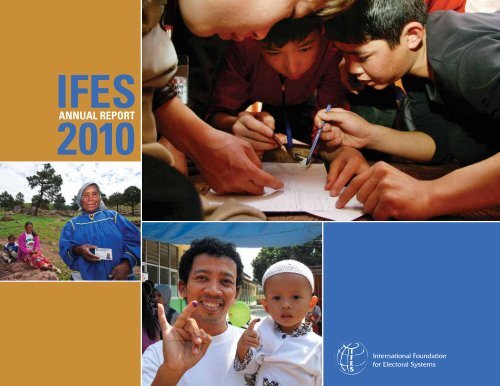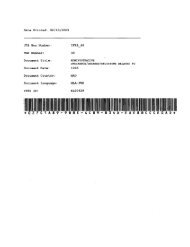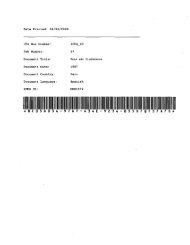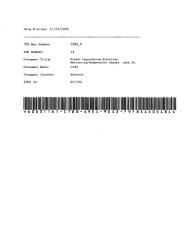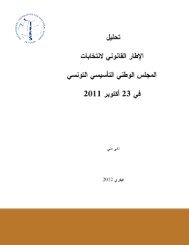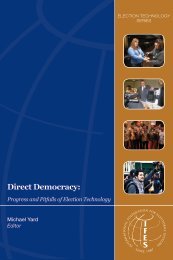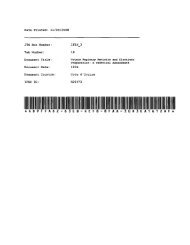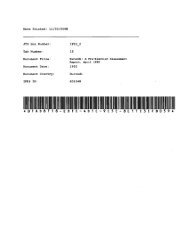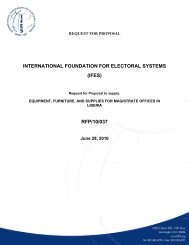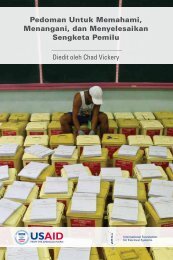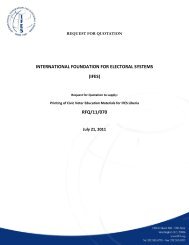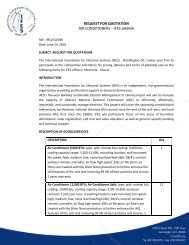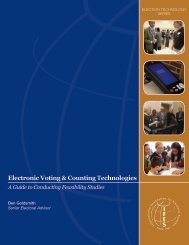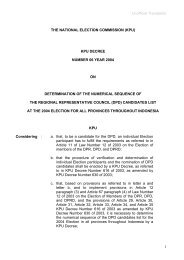Download - IFES
Download - IFES
Download - IFES
Create successful ePaper yourself
Turn your PDF publications into a flip-book with our unique Google optimized e-Paper software.
<strong>IFES</strong><br />
2010<br />
annual report<br />
<strong>IFES</strong> 2010 annual report 1
About Us<br />
The International Foundation for Electoral Systems (<strong>IFES</strong>) is a global<br />
leader in election assistance and democracy promotion.<br />
<strong>IFES</strong> promotes democratic stability by providing technical<br />
assistance and applying field-based research to the electoral cycle<br />
in countries around the world to enhance citizen participation and<br />
strengthen civil societies, governance and transparency.<br />
Every <strong>IFES</strong> project is staffed by national and international<br />
personnel while partnering with local election management bodies<br />
and civil society organizations. This homegrown approach ensures<br />
that the expertise offered by <strong>IFES</strong> fits the needs of the country<br />
or context and the benefit of assistance outlasts the life of the<br />
project. Our work is nonpartisan and also includes projects that:<br />
o Help citizens participate in their democracies<br />
o Increase politicians’ accountability to the electorate<br />
o Strengthen government institutions<br />
Since its founding in 1987, <strong>IFES</strong> has worked in 133 countries—from<br />
developing to mature democracies.<br />
<strong>IFES</strong> is a non-governmental organization and registered as a<br />
501(c)3 in the United States.<br />
For more information, visit www.<strong>IFES</strong>.org.<br />
inside<br />
2 <strong>IFES</strong> Leadership<br />
3 Executive Message<br />
4 January: Haiti<br />
5 February: Tajikistan<br />
6 March: Iraq<br />
7 April: Burundi<br />
8 May: Philippines<br />
9 June: Morocco<br />
10 July: Kyrgyzstan<br />
11 August: West Bank/Gaza<br />
12 September: Afghanistan<br />
13 October: Ukraine<br />
14 November: Guinea<br />
15 December: Kosovo<br />
16 Our Experts<br />
18 Events<br />
20 Joe C. Baxter Award<br />
21 Fellowships<br />
22 Publications<br />
23 Finances/Supporters<br />
24 Photography Contest<br />
offices<br />
Americas | Guatemala | Haiti | Nicaragua<br />
Africa | Burundi | Chad | DRC | Guinea | Liberia | Niger | Nigeria | Senegal | Sierra Leone | Sudan | Uganda | Zimbabwe<br />
Asia | Afghanistan | Cambodia | Indonesia | Nepal | Pakistan | Philippines<br />
Europe | Armenia | Georgia | Kosovo | Kyrgyzstan | Moldova | Serbia | Ukraine<br />
Middle East & North Africa | Egypt | Iraq | Jordan | Lebanon | Tunisia | West Bank/Gaza<br />
<strong>IFES</strong> 2010 annual report 1
<strong>IFES</strong> leadership<br />
Board of Directors<br />
Peter G. Kelly, Chairman<br />
William J. Hybl, Vice-Chairman<br />
Hon. Leon J. Weil, Secretary<br />
Lesley Israel, Treasurer<br />
Hon. Howard Henry Baker Jr.<br />
Hon. Mary Banotti<br />
Judy A. Black<br />
Hon. Ken Blackwell<br />
Hon. Hank Brown<br />
Sean Cleary<br />
Hon. Paula J. Dobriansky<br />
Frederick P. Furth, Esq.<br />
Jeffrey L. Glassman<br />
Amb. Stuart Holliday<br />
Hon. Steny Hoyer<br />
Hon. Barbara B. Kennelly<br />
Maureen A. Kindel<br />
Kathleen M. Linehan, Esq.<br />
Hon. Robert L. Livingston<br />
Hon. Richard Lugar<br />
Sheila Avrin McLean<br />
Hon. Denise Nappier<br />
His Excellency Andrés Pastrana<br />
R. Scott Pastrick<br />
Michael Pinto-Duschinsky, Ph.D.<br />
Richard C. Powell Jr.<br />
Amb. Gerard Stoudmann<br />
Executive Management<br />
William R. Sweeney Jr., President/CEO<br />
Carina Perelli, Executive Vice President<br />
Michael Svetlik, Vice President of Programs<br />
Kimberley Atsalinos, Vice President of<br />
Contracts & Grants/Chief Compliance Officer<br />
Michael Bryan, Vice President of Finance/<br />
Chief Financial Officer<br />
Daniela Colaiacovo, Communications &<br />
Advocacy Director<br />
Anchal Gupta, Human Resources Director<br />
2 <strong>IFES</strong> 2010 annual report
executive message<br />
Dear Friends:<br />
As <strong>IFES</strong> approaches its 25th anniversary, we began 2010<br />
by analyzing all operations and their impact in the field.<br />
Our three key support divisions—Human Resources,<br />
Finance and Communications—refined processes to<br />
increase the team’s efficiency, effectiveness and visibility,<br />
internationally and domestically. These new processes<br />
focus on innovation, building a strong network of<br />
democracy supporters and leaving lasting impacts across our world.<br />
The <strong>IFES</strong> team decided it is time to embrace our role as a thought leader in democracy<br />
and elections. We published several innovative pieces in the latter part of 2010 with more<br />
coming in 2011. <strong>IFES</strong>’ key strength lies in providing an expert perspective on the electoral<br />
process. This perspective helps election officials create the needed processes so citizens<br />
can vote for their desired future. You can read this in Haiti’s feasibility study, Ukraine’s public<br />
opinion survey and our electoral fraud white paper series, to name a few.<br />
Second, over the span of a generation, our <strong>IFES</strong> family has become quite extensive. We<br />
have hundreds of alumni, supporters, partners and public servants who have remained<br />
involved in various sectors of democracy development. The strength of our network was<br />
proven during Kosovo’s snap elections. During the Christmas season, we deployed 46<br />
dedicated professionals, secured logistical arrangements and maintained dialogue with<br />
security forces on the ground. This effort allowed North Kosovo citizens to cast their ballots<br />
for the first time in national elections since their independence.<br />
Third, the events in the Middle East and North Africa remind us that governance<br />
structures are not permanent. <strong>IFES</strong> believes all citizens should take an active role in the<br />
way they are governed. In order for this to occur in a<br />
non-violent process, governments must strive to be<br />
transparent, accountable and democratic. In Pakistan,<br />
we helped the election commission to develop its<br />
first five year strategic plan. By publishing this plan,<br />
they made a public commitment to increase their<br />
accountability. In Afghanistan, we created a Gender<br />
Unit within the election commission. This unit is able<br />
to appoint and employ women in the electoral and security sectors. With female poll<br />
workers and security officers present, women visibly and actively participate in the<br />
political sphere while proper respect is given to religious and cultural traditions.<br />
In addition, access to the political process remains a significant hurdle in many countries,<br />
and yet we work to ensure progress. In the Philippines, imprisoned detainees voted<br />
for the first time. To ensure Iraqis out of the country could vote in parliamentary elections,<br />
we assisted and worked directly with the election commission to organize out-of-country<br />
voting in 15 countries around the world—a specialty of <strong>IFES</strong>.<br />
And finally, after working in 133 countries the list of exceptional people committed to freedom<br />
and democracy is immense. We honored Dr. Kwadwo Afari-Gyan, Chairman of Ghana’s<br />
Electoral Commission, with the Joe C. Baxter Award for his commitment to a just electoral<br />
process. The Charles T. Manatt Democracy Awards were presented to U.S. Representative<br />
David Obey (D-WI), former USAID Administrator M. Peter McPherson and Lebanese Minister<br />
of Interior and Municipalities Ziad Baroud for their dedication to democratic development.<br />
This year, <strong>IFES</strong>’ Democracy Award Dinner will be held on September 15, 2011. We invite<br />
you to join us in celebrating the International Day of Democracy.<br />
Peter G. Kelly, Chairman William J. Hybl, Vice-Chairman William R. Sweeney Jr., President/CEO<br />
<strong>IFES</strong> 2010 annual report 3
January:<br />
Haiti<br />
Assess the damage<br />
Cancelled elections, demolished infrastructure<br />
and missing political leaders. Haiti’s<br />
challenges increased 10-fold in the wake of<br />
the January 2010 earthquake. Yet, Hai-<br />
credible election, accepted by the people.<br />
The feasibility study showed that the<br />
operational arm of the Provisional Elections<br />
Commission (CEP) was ready to implement<br />
elections as soon as logistically possible<br />
“Haiti was the site of our first field office.<br />
Over 20 years we have had the honor of<br />
working closely with many in Haiti and<br />
especially so through this trying time.”<br />
Gary Ouellet<br />
tians still wanted to have “elected officials<br />
replace elected officials” despite the lack of<br />
and dependent on support from the international<br />
donor community.<br />
Bill Sweeney, President and CEO<br />
basic needs and rising death toll.<br />
The most reasonable, feasible and logical<br />
In light of these desires, <strong>IFES</strong> analyzed<br />
scenario was that presidential and legisla-<br />
the impact of the earthquake on executive<br />
tive elections be held together before the<br />
and legislative powers and the possibility<br />
end of 2010, then municipal council, town<br />
with the CEP to ensure voters had time to<br />
of conducting a free and fair election. The<br />
delegate and communal elections as soon<br />
verify their polling station location; deploy<br />
constitutional analysis called for renewed<br />
as possible in 2011. This would ensure thor-<br />
additional, qualified personnel; and candi-<br />
respect and order for Haitian governance.<br />
ough participation, provide time and space<br />
dates and political parties would respect the<br />
This could only be achieved through a<br />
for multiple elections and allow displaced<br />
outcome of the election.<br />
people time to find a more stable residence.<br />
Elections were eventually determined<br />
to be held in November 2010. <strong>IFES</strong> worked<br />
Arindam Banerjee/iStock<br />
4 <strong>IFES</strong> 2010 annual report
february:<br />
tajikistan<br />
Know the issue<br />
In the early weeks of February, <strong>IFES</strong> conducted<br />
a series of Election Fairs across<br />
Tajikistan in advance of the 28 February<br />
national and municipal legislative elections.<br />
Each fair featured informational booths on<br />
political parties and elections with traditional<br />
music and refreshments for a festive<br />
atmosphere.<br />
The first fair was outdoors in the southern<br />
city of Qurghonteppa, attracting nearly<br />
1,000 people. The second fair took place<br />
in the northern city of Khujand, in the<br />
local Youth Palace. Nearly 1,500 people<br />
attended. The third fair, held in<br />
the capital city of Dushanbe in<br />
a movie theater, allowed each<br />
political party allotted time<br />
to address the audience.<br />
Approximately 2,000 citizens<br />
attended.<br />
At each event, <strong>IFES</strong><br />
provided copies of political<br />
party platforms, the election<br />
law and get-out-the-vote<br />
materials and posters<br />
for public distribution.<br />
The fairs attracted a diverse crowd—men<br />
and women, seniors and students. <strong>IFES</strong><br />
was able to engage about 4,500 Tajikistani<br />
citizens. In Dushanbe alone, nearly 10,000<br />
printed copies of party platforms were<br />
distributed. <strong>IFES</strong>’ Election Fairs gave voters<br />
a chance to speak with political party<br />
representatives and become familiar with<br />
campaign platforms and initiatives prior to<br />
local and national elections.<br />
“The elections were peaceful, relatively<br />
orderly and it appears they might help<br />
advance democracy [even though] Tajikistan<br />
fell short of many OSCE standards for free<br />
and fair elections.”<br />
Michael Getto, Tajikistan Chief of Party<br />
<strong>IFES</strong> 2010 annual report 5
mARCH:<br />
IRAQ<br />
Make a local impact<br />
For the first time, Iraqi out of country voters<br />
had the opportunity to vote in the Council of<br />
Representatives (CoR) elections at the provincial<br />
level. This was a major democracy milestone.<br />
Previously, Iraqis casting ballots abroad<br />
were only able to vote at the national level.<br />
<strong>IFES</strong> provided the Independent High<br />
Electoral Commission (IHEC) with a team of<br />
eight <strong>IFES</strong> experts. They were based at the<br />
Out-of-Country Voting (OCV) headquarters<br />
in Erbil, Iraq, to assist and work directly<br />
with the IHEC out-of-country voting team.<br />
Additionally, 24 <strong>IFES</strong> country advisors<br />
were deployed to 15 countries to further<br />
provide direct support to the IHEC country<br />
managers.<br />
Key lessons learned from the 2005 elections<br />
were implemented in the 2010 OCV<br />
operations. Despite the short timeframe,<br />
registration and voting took place successfully<br />
and simultaneously over a period of<br />
three days beginning 5 March. Ballot counting<br />
took place at the polling station in a<br />
concerted effort to enhance transparency.<br />
Greg Whitesell<br />
“As an <strong>IFES</strong> staff member working on Iraq<br />
OCV just made me more excited because<br />
I’m doing something to help my country.<br />
It’s the first time I felt proud walking<br />
around with a ‘stained’ finger!”<br />
Ragheed Al Ameen, <strong>IFES</strong> Contracts & Grants Specialist<br />
6 <strong>IFES</strong> 2010 annual report
APRIL:<br />
BURUNDI<br />
Gabrielle Bardall<br />
Elections in peace<br />
Burundi’s first-ever nationwide election<br />
violence prevention system, Amatora Mu<br />
Mahoro (Elections in Peace), was launched<br />
in April. The system identifies areas susceptible<br />
to electoral violence as well as successful<br />
peace initiatives around the country.<br />
Amatora Mu Mahoro ran through September<br />
after the last of the five 2010 elections<br />
occurred (communal, presidential, national<br />
assembly, senate and local).<br />
The Amatora Mu Mahoro system draws<br />
on <strong>IFES</strong>’ ongoing EVER Project (Elections<br />
Violence Education and Resolution), successful<br />
in over a dozen countries since<br />
2003. The system also introduces Ushahidi,<br />
a web platform developed by the Kenyans<br />
in response to the 2007-2008 electoral<br />
violence. This platform allows rapid sharing<br />
of information on peace and violence<br />
incidents via SMS.<br />
Reports from Amatoro Mu Mahoro verified<br />
occurrences of peace activities and<br />
election violence incidents from over 450<br />
monitors in all of Burundi’s 129 communes.<br />
By offering comprehensive, reliable data<br />
for violence mitigation efforts, the program<br />
consolidates and builds on Burundi’s<br />
achievements in peace-building in the last<br />
decade.<br />
“Amatora Mu Mahoro responded to<br />
threats throughout the electoral process<br />
preventing and mitigating electionrelated<br />
conflict. Burundi will continue<br />
peace-building with this additional tool.”<br />
Samia Mahgoub, Burundi Chief of Party<br />
<strong>IFES</strong> 2010 annual report 7
MAy:<br />
PHILIPPINES<br />
Increase access<br />
On 10 May over 50 million Filipinos cast<br />
their ballots for national and key local<br />
offices. For the first time, the electoral pro-<br />
term election monitoring, legal advice to<br />
citizens and observers, voter education and<br />
election observation in the Autonomous<br />
Region of Muslim Mindanao (ARMM), cam-<br />
youth. Election administrators and deputies<br />
were trained on the right to vote and<br />
materials for advocacy activities and voter<br />
education were developed.<br />
John Lawrence<br />
cess was automated using Precinct Count<br />
paign finance monitoring and advocacy for<br />
Express lanes, satellite registration sites<br />
Optical Scan (PCOS) machines deployed to<br />
revising election adjudication procedures.<br />
and a special registration day were created<br />
76,340 precincts.<br />
In addition, <strong>IFES</strong> engaged the Commis-<br />
for persons with disabilities and the elderly.<br />
<strong>IFES</strong> supported the Commission on Elec-<br />
sion on Human Rights, COMELEC and civil<br />
A major breakthrough was achieved when<br />
tions (COMELEC) by creating user-friendly<br />
society groups on spearheading activities<br />
detainees were allowed to register and vote<br />
training materials for poll workers and<br />
to grant the right to vote for the most vul-<br />
in jails for the first time in Philippine his-<br />
reviewing technical issues for implement-<br />
nerable: persons with disabilities, elderly,<br />
tory. <strong>IFES</strong> was part of the technical working<br />
ing an automated electoral process. <strong>IFES</strong><br />
detainees, indigenous peoples, internally<br />
group that drafted the implementing rules<br />
supported many efforts in the areas of long-<br />
displaced, overseas absentee voters and<br />
and regulations for detainee-voting. <strong>IFES</strong><br />
also developed a reference guide used by<br />
the special board of election inspectors<br />
who conducted elections in jails.<br />
“The strength of a democratic electoral<br />
process is seen when an election<br />
management body ensures the most<br />
vulnerable sectors of society are able to<br />
exercise their right to vote. The Philippines<br />
signaled a new commitment to emphasizing<br />
a human-rights based approach in<br />
conducting elections.”<br />
Beverly Hagerdon Thakur, Philippines Chief of Party<br />
8 <strong>IFES</strong> 2010 annual report
JUNE:<br />
MOROCCO<br />
Reuters/Rafael Marchante<br />
Data can ensure equality<br />
International bodies have recognized that<br />
women’s participation in the electoral and<br />
political process is essential to any growing<br />
democracy. <strong>IFES</strong> and the Institute for<br />
Women’s Policy Research (IWPR) conducted<br />
a national survey on attitudes towards the<br />
political, economic, social and legal status<br />
of women in Morocco.<br />
Results showed that while women’s<br />
participation is low, there is high support<br />
for establishing gender quotas from both<br />
sexes. Knowing there is high support in a<br />
particular area will supplement and focus<br />
the efforts of local organizations which are<br />
working to improve the standing of women<br />
in the Middle East and North Africa region.<br />
Survey data is collected and then given<br />
to local groups that focus on women’s<br />
issues. <strong>IFES</strong> then conducts workshops to<br />
show them how to use the information to<br />
advance their advocacy goals. Participants<br />
usually include representatives from NGOs,<br />
ministries, academics and parliamentarians.<br />
At the end of the Morocco workshop,<br />
participants issued numerous recommendations:<br />
create targeted public awareness<br />
campaigns to inform women about new<br />
or existing laws; urge women’s advocacy<br />
groups to use media to reach women; and<br />
reform education policy to be more inclusive<br />
to combat illiteracy among women.<br />
The Status of Women in the Middle East<br />
and North Africa (SWMENA) project will<br />
publish recommendations for Lebanon,<br />
Morocco and Yemen in a comprehensive<br />
report, to be issued in 2011.<br />
“The survey and data analysis provided solid ground for<br />
strengthening women’s political representation and tools<br />
for advocacy. Advocating for social justice and gender<br />
equality will allow us to change women’s status in Morocco.”<br />
Fatima Outaleb, SWMENA Advisor and Board Member of Union de L’Action Feminine<br />
<strong>IFES</strong> 2010 annual report 9
july:<br />
kyrgyzstan<br />
You change the world<br />
Since 2000, <strong>IFES</strong> has hosted over 20 Youth<br />
Democracy Camps. These camps have<br />
instilled an understanding of democratic<br />
values and leadership skills while educating<br />
boys and girls on their roles as citizens and<br />
how they can advocate for change in their<br />
of similar projects throughout Kyrgyzstan.<br />
The popularity and success of the camps<br />
is evident in the large Alumni Network,<br />
the successful projects they implement<br />
themselves and the number of applications<br />
received to attend a Democracy Camp. In<br />
2010, <strong>IFES</strong> received over 1,000 applicants<br />
“Now I am not<br />
waiting for my future,<br />
I am making it<br />
by myself.”<br />
Ermek Abdykalykov,<br />
2010 participant<br />
Dmitry Shevkun<br />
society. The camp is highly interactive and<br />
for 161 slots. <strong>IFES</strong>’ Youth Democracy Camps<br />
features group discussions, simulations,<br />
are dedicated to those who are commit-<br />
small-group exercises, games and competi-<br />
ted to educating themselves to change the<br />
tions, cultural activities and sports.<br />
world.<br />
Each 10-day camp concludes with a<br />
call to action: “How can I apply my new<br />
knowledge and skills? What can I do for my<br />
school, street, village and town?” Yulya Protopopova<br />
and Janat Erkinbek kyzy, two 9th<br />
graders, wanted to share their discoveries<br />
with other students at their school. The two<br />
conducted democracy camps and helped<br />
organize school elections. Most impressively,<br />
the girls successfully organized and<br />
led a 1-hour training on “Responsible and<br />
Sustainable Leadership” during a meeting<br />
of school directors, vice directors and<br />
regional education officials.<br />
Camp alumni have carried out dozens<br />
10 <strong>IFES</strong> 2010 annual report
west bank/gaza<br />
august:<br />
George Azar<br />
Planning never ends<br />
Early in 2010, long overdue local elections<br />
were finally scheduled by the Palestinian<br />
Authority’s Council of Ministers for July.<br />
However, by 10 June—the last day of<br />
nomination period—the Central Election<br />
Commission (CEC) had received less than<br />
10 percent of the expected number of applications.<br />
With only a few hours remaining in<br />
the nomination period, the Council decided<br />
to postpone elections. In direct response,<br />
four political parties challenged the legality<br />
of that decision.<br />
Recognizing a final ruling would take<br />
time, <strong>IFES</strong> and the CEC held a lessons<br />
learned conference in August to evaluate<br />
the stages of the electoral process completed<br />
in Palestine and identify areas for<br />
improvement. Forty CEC staff discussed<br />
voter education, logistics, voter registration<br />
and nomination of candidates. Working in<br />
small groups, participants presented conclusions<br />
and recommendations to the full<br />
group at the end of each session.<br />
Since the conference, the Palestinian<br />
Authority had called for local elections in<br />
July 2011. However, the recent reconciliation<br />
agreement between Fatah and Hamas<br />
sets a different timeline. The next several<br />
months will be critical as a new interim<br />
government forms and elections are<br />
expected in less than one year.<br />
“If elections in Palestine<br />
remain an event which<br />
occurs only in extraordinary<br />
political circumstances,<br />
voter trust and participation<br />
will continue to decrease.”<br />
Vlad Pran, West Bank/Gaza<br />
Chief of Party<br />
<strong>IFES</strong> 2010 annual report 11
september:<br />
afghanistan<br />
Informed voting<br />
The central challenge to the 2010 election<br />
was the limited understanding of the electoral<br />
process, in addition to the palpable<br />
skepticism and distrust for the electoral<br />
process.<br />
<strong>IFES</strong> implemented a public information<br />
campaign with the Electoral Complaints<br />
Commission (ECC) to disseminate materials<br />
explaining the ECC’s work and the<br />
complaints process. <strong>IFES</strong> also assisted the<br />
Independent Election Commission’s (IEC)<br />
Gender Unit in successfully appointing<br />
and training individuals in sexual harassment<br />
and gender issues in all 34 Afghan<br />
provinces. In addition, journalism training,<br />
political finance monitoring and dialogue<br />
and debate served to educate the electorate<br />
on issues-based elections.<br />
To address individual questions from<br />
voters, <strong>IFES</strong> supported an IEC call center<br />
with operators that answered callers’ questions<br />
about the elections for free. From<br />
July through October, the center served<br />
almost 1 million callers. For general public<br />
education, <strong>IFES</strong> produced print, radio and<br />
television announcements that promoted<br />
voting and disseminated information about<br />
the election process. Face-to-face civic<br />
education sessions for men and women<br />
in 32 provinces resulted in over 1.8 million<br />
people realizing the importance of their<br />
contribution in the political sphere.<br />
To track voter participation and increase<br />
security and credibility in the electoral<br />
process, <strong>IFES</strong> provided software for computerized<br />
mapping of polling stations as<br />
a tool to analyze the number of voters per<br />
polling station and track the movement of<br />
election materials throughout the country<br />
for Election Day.<br />
“This election stands as a tremendous<br />
milestone towards democratic<br />
development and support for the electoral<br />
process. Despite this success, there remain<br />
considerable challenges to achieving<br />
greater, broad based participation.”<br />
Carina Perelli, Executive Vice President<br />
Shaima Khinjani<br />
12 <strong>IFES</strong> 2010 annual report
october:<br />
ukraine<br />
Marie Frechon<br />
The pulse of a nation<br />
<strong>IFES</strong> conducted its 18th public opinion poll<br />
in Ukraine six months after President Yanukovych<br />
won the election. Surveys such as<br />
these allow governments to feel the pulse<br />
of their constituency and respond accord-<br />
Ukraine’s survey results revealed that<br />
citizens are significantly concerned about<br />
the deterioration of certain rights and freedoms<br />
under the Yanukovych administration.<br />
This was in line with a belief in the decline<br />
of freedom of the press and in respect for<br />
“Surveys are a valuable resource for those interested in<br />
the democratic development process in Ukraine since<br />
its independence. They allow observers to track the<br />
ebbs and flows of public opinion on critical issues and<br />
the public’s role in the democratic process.”<br />
ingly. It helps governments create information<br />
campaigns, focus on particular issues<br />
citizens’ rights.<br />
Despite the Yanukovych administration<br />
Rakesh Sharma, Applied Research Director<br />
of significant concern to the people and<br />
receiving relatively high marks in foreign<br />
promote the development of democratic<br />
policy with Russia, there are continuing<br />
and participatory institutions, processes<br />
concerns about economic issues, corrup-<br />
and culture.<br />
tion, inflation and job creation.<br />
Overall, 44 percent of Ukrainians feel the<br />
country is on the path toward instability.<br />
Although a net negative sentiment, it represents<br />
an improvement since 74 percent<br />
said the country was on the path toward<br />
instability in the 2009 <strong>IFES</strong> survey.<br />
<strong>IFES</strong> 2010 annual report 13
november:<br />
guinea<br />
First elected president since 1958<br />
Guinean society participated in a presidential<br />
runoff on 7 November. After decades<br />
of dictatorship, Guinea held the first round<br />
of its first legitimate presidential election<br />
procedures, training, communication<br />
and voter education. <strong>IFES</strong> participated in<br />
planning and coordination meetings to<br />
provide recommendations and advice on<br />
implementation.<br />
The November runoff was peaceful<br />
and better organized with results coming<br />
in at regular intervals. Eight days<br />
later, the CENI announced final provisional<br />
results showing that Alpha Condé<br />
Gabrielle bardall<br />
earlier in 2010. Although first round results<br />
<strong>IFES</strong> worked with the CENI’s training<br />
defeated Cellou Dalein Diallo with 52.52<br />
were accepted by the population, the poll<br />
department to build capacity of poll work-<br />
percent of the vote. At the end of the year,<br />
revealed that Guinea’s Electoral Commis-<br />
ers for the second round of presidential<br />
Guinea’s Supreme Court officially ruled<br />
sion (CENI) had to make many improve-<br />
elections. <strong>IFES</strong> developed materials and<br />
Alpha Condé the winner of the November<br />
ments to the voting process.<br />
strategy to instruct a core set of trainers<br />
presidential runoff election. These sets of<br />
<strong>IFES</strong>’ assistance to the CENI focused on<br />
who ultimately prepared 50,000 qualified<br />
elections were the first, true democratic<br />
a number of different areas: operations,<br />
poll workers.<br />
polls in Guinea’s history.<br />
UNDP<br />
“Guinea has a new President! Both candidates<br />
made declarations asking their followers to<br />
accept the verdict of the Supreme Court.<br />
This is a truly historic moment for Guinea.”<br />
Elizabeth Côté, Guinea Chief of Party<br />
14 <strong>IFES</strong> 2010 annual report
december:<br />
kosovo<br />
below: samir kavahoda<br />
National election in five weeks<br />
Kosovo originally planned for elections in<br />
November 2011. However, following the<br />
resignation of then-President Fatmir Sejdiu<br />
in September 2010, Assembly Speaker Jakup<br />
Krasniqi became acting president of Kosovo.<br />
Divisions within coalitions and increasing<br />
Political tension continued to mount and a<br />
no-confidence motion was introduced in the<br />
Assembly and passed on 2 November. After<br />
the motion was adopted, Acting President<br />
Krasniqi dissolved the Assembly and moved<br />
the elections earlier by another two months.<br />
Election Day was now 12 December.<br />
“With very little lead time…due to <strong>IFES</strong><br />
efforts [the] Government of Kosovo was<br />
able to offer the choice of an election to<br />
citizens in the North for the first time.”<br />
Patricia Radar, USAID/Kosovo Mission Director<br />
tensions led to Krasniqi announcing elec-<br />
The political environment left the Central<br />
tions would be held in February 2011, nine<br />
Election Commission (CEC) with a severely<br />
months earlier than expected.<br />
restricted timeline to implement the Assem-<br />
As a result, the Working Group on Elec-<br />
bly election nationwide. This parliamentary<br />
tions (WGE) focused on two reforms: voting<br />
election was Kosovo’s first since declaring<br />
for multiple candidates and streamlining<br />
independence from Serbia in 2008.<br />
the complaints and appeals process. <strong>IFES</strong><br />
To assist the CEC, <strong>IFES</strong> quickly ramped<br />
assisted the WGE on drafting an amendment<br />
up its logistics and recruitment efforts. <strong>IFES</strong><br />
to allow for the recommended reforms; it<br />
administered 14 alternative polling stations<br />
passed the Assembly on 29 October.<br />
in northern Kosovo where the Election<br />
Commission experienced difficulty recruiting<br />
for and opening regular polling centers.<br />
<strong>IFES</strong> arranged international teams<br />
of poll workers to staff the stations<br />
and helped ensure proper handling of<br />
election materials before the votes<br />
were counted.<br />
<strong>IFES</strong> 2010 annual report 15
our experts<br />
<strong>IFES</strong>’ expertise on electoral processes is<br />
unparalleled. With over 50 in-house experts<br />
to address the variety of topics that come<br />
into play when planning, preparing and<br />
executing an election, we ensure each<br />
project is customized to a nation’s need<br />
and delivers measurable results.<br />
On Women’s Empowerment<br />
At <strong>IFES</strong>, women’s empowerment is seen<br />
as a crucial element of democracy, since<br />
democracy cannot exists if a significant<br />
portion of the population does not have an<br />
equal say in the country’s government and<br />
affairs. To that effect, many of our programs<br />
include a strong focus on increasing<br />
women’s participation in elections and<br />
political processes.<br />
In Guinea, for example, <strong>IFES</strong> facilitated<br />
the creation of a widespread grassroots<br />
women’s movement, which advocated for<br />
the participation of women in all sectors<br />
related to elections. In India, <strong>IFES</strong> worked<br />
with over 50 organizations and government<br />
entities to empower women and promote<br />
women’s rights. In Afghanistan, <strong>IFES</strong> helped<br />
the elections commission establish a Gender<br />
Unit to ensure more women were part of the<br />
election commission and the voting process.<br />
Millions of women and men benefited from<br />
these efforts.<br />
“Illiteracy in Guinea is still the main obstacle to<br />
women participating in the electoral process.<br />
Without writing or reading skills it is difficult<br />
to run a polling station. Women in Guinea<br />
showed an unprecedented desire to learn and be<br />
engaged in their own future. Future generations<br />
are set to start several leaps ahead.”<br />
Elizabeth Côté, Chief of Party, Guinea<br />
“A bird with one strong and one weak wing can<br />
never reach great heights. That is why in our<br />
work men are always seen as integral partners.<br />
When men and women work together to<br />
understand and promote equality—a powerful<br />
transformation occurs. It’s like nothing they<br />
have seen before. Everyone benefits.”<br />
Vasu Mohan, Deputy Director, Asia<br />
“Looking back at the accomplishments of the<br />
Gender Unit within the IEC over the past two years<br />
serves as a great reward to everybody on our<br />
team. The Unit focused on training and outreach<br />
to disenfranchised women and put an emphasis<br />
on addressing women’s issues in an innovative<br />
and practical manner. The Gender Unit can<br />
serve as a model because it addressed women’s<br />
participation in the workplace and daily life.”<br />
Belma Ejupovic, Sr. Program Manager, Afghanistan<br />
16 <strong>IFES</strong> 2010 annual report
On Access for<br />
Disabled Persons<br />
People with disabilities comprise at least<br />
10 percent of the global population, and<br />
approximately 80 percent of this population<br />
lives in developing nations. Yet they<br />
remain largely invisible to the decision- and<br />
policy-makers who design and implement<br />
government programs. To address these<br />
concerns, <strong>IFES</strong> is leading a series of initiatives<br />
to promote the electoral and political<br />
enfranchisement of people with disabilities<br />
in several different arenas.<br />
For example, in Kosovo, <strong>IFES</strong> produced<br />
audio cassettes to assist blind voters in<br />
making their selections. In partnership with<br />
local organizations in Honduras, <strong>IFES</strong> created<br />
tactile ballots, which allowed visually<br />
impaired voters to cast their votes directly<br />
without assistance to read the information<br />
on the ballots. In Lebanon, <strong>IFES</strong> measured<br />
all polling centers for their accessibility to<br />
persons with disabilities and printed booklets<br />
containing a technical analysis of the<br />
results to improve accessibility to polling<br />
stations.<br />
“One of the basic tenets we espouse is<br />
equality in voting rights. To attain this equality<br />
you need to do more than just draft good laws.<br />
By working with NGOs to create materials<br />
such as tactile ballots and audio guides, many<br />
disabled voters in Kosovo have finally been<br />
able to exercise their vote independently,<br />
without assistance, and in secret.”<br />
Gavin Weise, Deputy Director, Europe<br />
“Persons with disabilities have always been at<br />
the margins of society. Their participation in the<br />
electoral process has traditionally been low due<br />
to a lack of understanding of their rights. It was an<br />
honor to be part of a program which empowered<br />
this community to vote unassisted and with<br />
complete freedom for the first time in Honduras.”<br />
Ana Santos, Program Officer, Latin America<br />
“<strong>IFES</strong> is committed to helping countries meet<br />
their commitments under the UN Convention on<br />
the Rights of Persons with Disabilities. Joint<br />
projects like mapping the problems facing<br />
disabled voters and drafting legal guarantees<br />
of equal treatment allows election authorities<br />
and civil society to ensure this community<br />
participates in political and public life.”<br />
Richard Chambers, Chief of Party, Lebanon<br />
<strong>IFES</strong> 2010 annual report 17
Events<br />
Salute to Peter Kelly:<br />
Living Large<br />
On 8 June 2010 in Hartford, Connecticut,<br />
Peter Kelly, Chairman of <strong>IFES</strong>’ Board of<br />
Directors, was honored in a tribute surrounded<br />
by friends and colleagues. He was<br />
celebrated for his lifelong dedication to<br />
many of Connecticut’s fundamental institutions—including<br />
Saint Joseph’s Hospital<br />
and Connecticut Public Radio—in addition<br />
to other organizations in the United States<br />
and around the world.<br />
The event, entitled “Living Large”, was<br />
emceed by U.S. political strategists Mary<br />
Matalin and Ed Rollins. It included a<br />
number of video clips with congratulatory<br />
messages from friends and colleagues,<br />
including President Jimmy Carter, Speaker<br />
of the House Nancy Pelosi and Mr. Kelly’s<br />
partners at Updike, Kelly and Spellacy.<br />
Fellow Board Member, Representative<br />
Steny Hoyer (D-MD), and Senator Mark Warner<br />
(D-VA) were among the speakers of the<br />
night. They recognized Mr. Kelly for his ability<br />
to work with both sides of the aisle in his<br />
efforts to get things done. Charles T. Manatt,<br />
Board Chairman emeritus of <strong>IFES</strong> and a<br />
former U.S. Ambassador to the Dominican<br />
Republic, praised Mr. Kelly’s commitment to<br />
helping people around the world have a say<br />
in the way they are governed.<br />
The tribute was co-chaired by an impressive<br />
array of high-profile public figures and<br />
various members of Congress. President<br />
Jimmy Carter and Vice-President Al Gore<br />
were Honorary Chairs.<br />
“The night was extraordinary—a gathering of almost 1,000<br />
friends from all over the world. It was filled with civility and<br />
trust, a living proof that partisanship does not mean enmity.<br />
Civility is both possible and imperative for our government to<br />
function. We prove that every day!”<br />
Peter Kelly, Chairman, <strong>IFES</strong> Board of Directors<br />
18 <strong>IFES</strong> 2010 annual report
greg Whitesell<br />
U.S. Election Program<br />
<strong>IFES</strong>’ U.S. Election Program brings over 100 foreign diplomats,<br />
parliamentarians and election officials to Washington, D.C., to<br />
discuss and exchange ideas on electoral matters using the U.S.<br />
election as a common example.<br />
Since 1992, the program has occured during U.S. congressional<br />
and presidential elections. The event consists of multiple<br />
panel discussions featuring experts on topics such as modernizing<br />
voter registries, use of technology in the electoral process and the<br />
media’s role in covering elections.<br />
“This program underscores <strong>IFES</strong>’ belief<br />
that democracy, while shaped by national<br />
norms and customs, is guided by established<br />
international standards of accessibility and<br />
transparency.”<br />
Michael Svetlik, Vice President of Programs<br />
The hallmark of the program is a tour of U.S. polling stations to<br />
observe voting in the District of Columbia, Maryland and Virginia.<br />
Participants gain access to leading elections professionals and local<br />
and national representatives of government with valuable insight<br />
Charles T. Manatt<br />
Democracy Awards Dinner<br />
<strong>IFES</strong>’ Charles T. Manatt Democracy Awards<br />
recognize outstanding men and women<br />
who share a commitment to freedom and<br />
democracy. Every year an award is given<br />
to a Republican, a Democrat and a member<br />
of the international community to emphasize<br />
<strong>IFES</strong>’ belief that empowering people<br />
transcends political parties and national<br />
borders.<br />
The 2010 recipients were Representative<br />
David Obey (D-WI), former United States<br />
Agency for International Development<br />
(USAID) Administrator M. Peter McPherson<br />
and Lebanese Minister of Interior and<br />
Municipalities Ziad Baroud. The 2010 dinner<br />
was co-chaired by Donald R. Sweitzer and<br />
the Honorable Robert L. Livingston.<br />
Baroud, a longtime lawyer and prominent<br />
civil society activist, has dedicated his<br />
life to civil society and government service.<br />
He is recognized worldwide for significant<br />
contributions to enhancing the electoral<br />
process in Lebanon.<br />
Former President Jimmy Carter said, “I<br />
have supervised more than 83 elections in<br />
83 countries worldwide but the best I have<br />
seen were in Lebanon [in 2009].”<br />
Former recipients include Representative<br />
Lee H. Hamilton (D-IN), His Excellency José<br />
Miguel Insulza of Chile, Senator Richard G.<br />
Lugar (R-IN), Monsignor Agripino Núñez<br />
Collado of the Dominican Republic, Senator<br />
James Inhofe (R-OK) and former Representative<br />
Tom Lantos (D-CA).<br />
SAVE THE DATE: September 15 is the<br />
International Day of Democracy! <strong>IFES</strong> will<br />
present the 2011 Democracy Awards that<br />
evening in Washington, D.C.<br />
into the electoral experience.<br />
The program wraps up with an evening reception while watching<br />
election returns and a post-Election Day briefing with a question<br />
and answer session.<br />
<strong>IFES</strong> 2010 annual report 19
Joe C. Baxter award<br />
“I have received quite a<br />
few awards in connection<br />
with my work as an election<br />
administrator, but I feel<br />
particularly honored today<br />
because this award carries<br />
Joe Baxter’s name.”<br />
Dr. Afari-Gyan<br />
Honoring Dr. Afari-Gyan<br />
Dr. Kwadwo Afari-Gyan, Chairman of Ghana’s<br />
Electoral Commission, was presented the<br />
Joe C. Baxter Award by Assistant Secretary of<br />
State Johnnie Carson (pictured below).<br />
Dr. Afari-Gyan was chosen as the 2010<br />
honoree for his invaluable contributions to<br />
democracy in Ghana, Africa and the world.<br />
Dr. Afari-Gyan has worked for more<br />
than two decades fulfilling the ideals the<br />
award recognizes. He has led Ghana’s<br />
Election Commission since 1992 after being<br />
appointed Deputy Chairman of the Interim<br />
National Electoral Commission by the thenruling<br />
military junta. His job was to ensure<br />
the November 1992 presidential election<br />
and the December 1992 parliamentary elections<br />
were free and fair. Dr. Afari-Gyan is<br />
credited with gaining the confidence of the<br />
public and all major political contestants<br />
by establishing and maintaining a record of<br />
impartiality and transparency.<br />
“Joe was of the view that…success<br />
depends on managing the political environment<br />
well. It is not just a matter of<br />
the election management body doing the<br />
preparations it is charged with, it also has<br />
to do with setting about to build a climate<br />
of legitimacy and credibility around the<br />
electoral process in the context of the<br />
prevailing political environment though its<br />
own actions,” said Dr. Afari-Gyan.<br />
Dr. Afari-Gyan served as Executive Secretary<br />
of the Association of African Election<br />
Authorities (AAEA), was a member of the<br />
Committee of Experts which drafted the<br />
Fourth Republican Constitution for Ghana<br />
and has published four books. He was also<br />
a lecturer and professor in political science<br />
at the University of Ghana and has lectured<br />
in the United States and Nigeria.<br />
<strong>IFES</strong>’ Joe C. Baxter Award recognizes the<br />
contribution of a professional whose skills,<br />
greg whitesell<br />
dedication and sacrifices epitomize the<br />
mission of <strong>IFES</strong> and embody the spirit of<br />
its namesake. Joe C. Baxter began his work<br />
with <strong>IFES</strong> in 1994 as Chief of Party in Ghana,<br />
setting up mechanisms to register 9.2<br />
million voters and train tens of thousands<br />
of election officials. From 1997-2002, as a<br />
senior advisor to <strong>IFES</strong>, his professionalism,<br />
kindness and respect left lasting impacts on<br />
the people he worked with during <strong>IFES</strong> missions<br />
to Africa, the Middle East and Asia.<br />
20 <strong>IFES</strong> 2010 annual report
Fellowships<br />
theresa chen<br />
Based at <strong>IFES</strong>’ F. Clifton White Applied Research Center for<br />
Democracy and Elections in Washington, D.C., Fellows engage<br />
experts and mentors while conducting independent research in<br />
democracy development. Each Fellowship is approximately six to<br />
eight weeks and ends with a published paper and presentation to<br />
the public and <strong>IFES</strong> colleagues.<br />
The Charles T. and Kathleen Manatt<br />
Democracy Fellowship<br />
Funded by former U.S. Ambassador to the Dominican Republic<br />
and former Chair of <strong>IFES</strong>’ Board of Directors Charles T. Manatt<br />
and wife, Kathleen, a $5,000 Manatt Fellowship is offered to<br />
outstanding graduate students from the American Midwest to<br />
conduct research in democracy-building. This Fellowship marked<br />
the inauguration of the Democracy Studies Fellowship program<br />
at <strong>IFES</strong>.<br />
Melanie G. Mierzejewski<br />
(pictured right), Manatt Research<br />
Fellow from the University<br />
of Illinois, explored Ukraine’s<br />
failure to achieve consolidation<br />
after the Orange Revolution by<br />
analyzing substantive, socioeconomic<br />
indicators that stalled<br />
democratization.<br />
The William and Kathy Hybl Democracy Fellowship<br />
Funded by William Hybl, Vice-Chairman of <strong>IFES</strong> Board of Directors, and wife, Kathy, a<br />
$5,000 Fellowship is offered to outstanding graduate students from the Rocky Mountain<br />
region to conduct research in democracy-building.<br />
Bozena Welborne, 2010 Hybl Research Fellow from the University of Colorado, explored<br />
why a controversial tool to promote women into the political arena has been the gender<br />
quota. Her paper explores the mix of incentives seen in gender quota adoption policies<br />
within legislatures across the Middle East and North Africa.<br />
“This Fellowship served as an invaluable gateway to the<br />
D.C. policy community, while providing a comfortable and<br />
engaging environment to conduct research.”<br />
Bozena Welborne, 2010 Hybl Research Fellow<br />
Election Administration Residency<br />
<strong>IFES</strong>’ Election Administration Residency is a professional enrichment<br />
program for Humphrey Fellows. This residency program brings one<br />
outstanding Humphrey Fellow to Washington, D.C., each year to learn<br />
more about democracy development, election administration and<br />
civic participation in the political process.<br />
The Residency is open to Humphrey Fellows with professional<br />
experience or interest in the field of elections, democracy, civil society<br />
and rule of law. The program is intended to enrich professional development<br />
through exposure to experts, academics and policy-makers<br />
working on issues critical to effective election administration and<br />
democratic development.<br />
<strong>IFES</strong> 2010 annual report 21
publications<br />
Direct Democracy: As democracies integrate<br />
Stalled on Substance: This study attempts to<br />
Electoral Fraud: A Basic Conceptual Frame-<br />
Status of Women: The findings from surveys<br />
technology in their<br />
understand the failure<br />
work: This paper<br />
conducted in Lebanon<br />
electoral processes,<br />
of Ukraine to achieve<br />
assesses the nature of<br />
and Morocco show<br />
practitioners and<br />
consolidation after the<br />
electoral fraud from<br />
that while women<br />
election officials need<br />
Orange Revolution<br />
an international com-<br />
may experience<br />
to know how best to<br />
by moving beyond<br />
parative perspective<br />
similar obstacles to<br />
preserve transparency<br />
institutional achieve-<br />
to provide an under-<br />
their advancement,<br />
and accessibility to<br />
ments and analyzing<br />
standing and a set of<br />
each country presents<br />
benefit from the effi-<br />
substantive, socio-<br />
strategies and tools to<br />
a different set of<br />
ciencies of technology.<br />
economic indicators.<br />
address the problem.<br />
challenges.<br />
2010 Wall Calendar: The 2010 wall calendar<br />
features photos from <strong>IFES</strong>’ photography<br />
Gender Quotas in the Arab World: One of<br />
the most controver-<br />
Guinea’s National Assembly, Judiciary and<br />
Security Systems:<br />
Pakistan 5-Year Plan: <strong>IFES</strong> assisted the Election<br />
Commission in its<br />
competition<br />
sial tools to promote<br />
Two case studies<br />
first plan that lays out<br />
and images of<br />
women into the politi-<br />
examine improve-<br />
15 major goals and<br />
civil society<br />
cal arena has been<br />
ments in governance<br />
focuses on: voter reg-<br />
and demo-<br />
gender quotas. This<br />
to prevent violent<br />
istration, civic/voter<br />
cratic gover-<br />
paper explores the<br />
conflict. The third case<br />
education, electoral<br />
nance around<br />
incentives seen in this<br />
study analyzes ways<br />
dispute resolution and<br />
the world.<br />
policy adoption across<br />
to reform the defense<br />
inclusion of marginal-<br />
the Middle East and<br />
and security sector in<br />
ized groups.<br />
Buyer’s Guide: The <strong>IFES</strong> Buyer’s Guide is the<br />
industry’s directory on<br />
companies; bringing<br />
together buyers and<br />
sellers of materials<br />
and services used in<br />
the electoral process.<br />
The Guide also<br />
includes case studies<br />
and articles on electoral<br />
issues.<br />
North Africa.<br />
Transition and Trepidation: The 18th survey<br />
conducted by <strong>IFES</strong><br />
reveals more Ukrainians<br />
believe the<br />
country is on a path<br />
towards stability.<br />
Information such as<br />
this helps the government<br />
in public information<br />
campaigns<br />
Guinea. (In French)<br />
Indonesia Electoral Survey: After the 2009<br />
general elections, a<br />
majority of Indonesians<br />
believe the<br />
country is headed in<br />
the right direction and<br />
support democracy.<br />
However, a significant<br />
majority lack information<br />
on the election<br />
Public Opinion Survey: This report provides<br />
insight into<br />
Tajikistanis’<br />
participation<br />
in the electoral<br />
process,<br />
voter turnout,<br />
and issues of<br />
greatest concern; thus helping create an effective<br />
voter education program.<br />
and policy making.<br />
process.<br />
See more publications on www.<strong>IFES</strong>.org.<br />
22 <strong>IFES</strong> 2010 annual report
FINANCESFY 2009-2010<br />
SUPPORTERS<br />
ASSETS<br />
Cash and cash equivalents<br />
Grants and contracts receivable, net<br />
Subrecipient advances<br />
Prepaid expenses and other current assets<br />
Travel advances<br />
Restricted certificates of deposit<br />
Property and equipment, net<br />
Total assets<br />
LIABILITIES AND NET ASSETS<br />
Liabilities<br />
Accounts payable and accrued liabilities<br />
Accrued salaries, taxes and leave<br />
Bank lines-of-credit<br />
Deferred revenue<br />
Deferred rent<br />
Total liabilities<br />
Commitments and contingencies<br />
Net assets<br />
Unrestricted<br />
Temporarily restricted<br />
Total net assets<br />
Total liabilities<br />
and net assets<br />
2010<br />
10,688,480<br />
8,490,640<br />
487,903<br />
482,160<br />
458,527<br />
464,337<br />
508,862<br />
$ 21,580,909<br />
5,055,920<br />
1,761,481<br />
4,000,000<br />
1,616,020<br />
1,516,595<br />
$ 13,950,016<br />
7,488,818<br />
142,075<br />
7,630,893<br />
$ 21,580,909<br />
Note:The above information represents audited financial statements of the International<br />
Foundation of Electoral Systems for the period ending September 30, 2010.<br />
Cash and cash equivalents<br />
49.53%<br />
Grants and contracts<br />
receivable, net 39.3%<br />
Subrecipient advances 2.26%<br />
Prepaid expenses and other<br />
current assests 2.24%<br />
Travel advances 2.12%<br />
Restricted certificates of<br />
deposit 2.15%<br />
A. Rifkin Company<br />
Adolfo Franco<br />
AETNA Cash and cash equivalents<br />
49.53%<br />
Alicia Smith<br />
Grants and contracts<br />
American Federation of<br />
receivable, net 39.3%<br />
Teachers<br />
Subrecipient advances 2.26%<br />
Argy, Wiltse & Robinson, P.C.<br />
Association Prepaid expenses of European and other<br />
Election current assests 2.24%<br />
Officials Travel advances 2.12%<br />
Australian Agency for<br />
International<br />
Restricted certificates of<br />
deposit 2.15%<br />
Development<br />
Automated Election Services<br />
Avante International<br />
Technology Inc.<br />
!B4 BEFORE<br />
Baker Hostetler LLP<br />
Barbara Eisenrauch<br />
Hon. Barbara B. Kennelly<br />
The Boeing Company<br />
British Foreign Commonwealth<br />
Office<br />
Brownstein Hyatt Farber<br />
Schreck LLP<br />
Broydrick & Associates<br />
Burson-Marsteller<br />
Cassidy & Associates<br />
Code International<br />
Copenhangen A/S<br />
Daniel Murray<br />
Daniel Lynch<br />
David Livingston<br />
DCS Group<br />
Hon. Denise Nappier<br />
Diane Mustard<br />
Direct Selling Association<br />
DMC—Worldwide<br />
Dominion Voting Systems<br />
Donald R. Sweitzer<br />
DRS Data Services Limited<br />
El Pomar Foundation<br />
Election Administration Reports<br />
Election Commission of<br />
Puerto Rico<br />
Election Systems and<br />
Software Inc.<br />
Embassy of Germany,<br />
Democratic Republic of the<br />
Congo<br />
European Commission<br />
Everyone Counts Inc.<br />
EWA Travel, Inc.<br />
Firas Maksad<br />
Forge Company<br />
Francine McMahon<br />
Garda World<br />
Gordon Sinclair<br />
GTECH<br />
Hawthorne Group<br />
Hewlett Packard Inc.<br />
Homeland Council<br />
HSBC North America<br />
International Association of<br />
Clerks, Recorders, Election<br />
Officials and Treasurers<br />
Israel Family Foundation<br />
J. Denis O’ Toole<br />
Jack Blaine<br />
Jan Sahlertz<br />
Jeffrey L. Glassman<br />
JoAnn Piccolo<br />
John Poulos<br />
Jon Woodward<br />
JPMorgan<br />
Judy A. Black<br />
Kathleen & Charles Manatt<br />
Kathleen M. Linehan<br />
Kathy & William Hybl<br />
KForce<br />
Kip O’Neill<br />
Lantrade Global Supplies<br />
Lauri Fitz-Pegado<br />
Lebanon Renaissance<br />
Foundation<br />
Hon. Leon J. Weil<br />
Lesley Israel<br />
Lithotech<br />
Livingston Group<br />
Marc Pearl<br />
Margaret B. Nagle<br />
Mark Braden<br />
Hon. Marty Russo<br />
Mary Parker<br />
Maureen A. Kindel<br />
McLarty Associates<br />
Merril Yavinsky<br />
Monta Ewing<br />
Nathan Jackson<br />
National Committee to Preserve<br />
Social Security and Medicare<br />
National Democratic Institute<br />
Naztec International Group LLC<br />
Norwegian Ministry of<br />
Foreign Affairs<br />
Organization for Security and<br />
Cooperation in Europe<br />
Patricia Keefer<br />
Prime Policy Group<br />
Printelect<br />
Randal Teague<br />
Renee & Wyatt Stewart<br />
Richard C. Powell Jr.<br />
Hon. Robert Livingston<br />
Russell Lindner<br />
R. Scott Pastrick<br />
Scytl<br />
Securities Industry and Financial<br />
Markets Association<br />
Sheila & David McLean<br />
Smith and Ouzman Limited<br />
Stephen Healey<br />
Susan Davis<br />
Susan & Peter Kelly<br />
Susan Salazar<br />
Susan & William R. Sweeney Jr.<br />
Hon. Stuart Holiday<br />
SysTest Labs<br />
T. Timothy Ryan Jr.<br />
Hon. C. Thomas McMillen<br />
Timeless Concepts Inc.<br />
Hon. Tom McDonald<br />
Tom Ollinger<br />
Tony Callahan, TYCO<br />
UK Department of International<br />
Development<br />
United Nations Development<br />
Programme<br />
United States Agency for<br />
International Development<br />
United States Department of<br />
State<br />
United Technologies Corporation<br />
US21 Inc.<br />
USAA Federal Savings<br />
Vorys, Sater, Seymour & Pease<br />
Wallis Foundation<br />
William Moore<br />
Yahoo<br />
<strong>IFES</strong> 2010 ANNUAL REPORT 23
photography contest<br />
2010 winners<br />
<strong>IFES</strong> conducts an annual democracy-themed photography competition as a means to profile<br />
the many ways individuals can demonstrate a sense of civic responsibility. The winner<br />
of each category receives $600 USD.<br />
Previous contests have drawn hundreds of entries from talented photographers from<br />
around the world. Outstanding entries are exhibited at <strong>IFES</strong>’ headquarters in Washington,<br />
displayed online at www.<strong>IFES</strong>.org, and frequently featured in <strong>IFES</strong> publications and outreach<br />
materials, including the annual <strong>IFES</strong> wall calendar.<br />
Dragos Dinu/<strong>IFES</strong><br />
<strong>IFES</strong> Choice Winner: Dragos Dinu/<strong>IFES</strong><br />
Even the houses are voting, aren’t they?<br />
Lebanese show their support for various candidates in 2009, Tripoli, Lebanon.<br />
Sebastien Galea<br />
Public Category Winner: Sebastien Galea<br />
Political rally in San Matias<br />
A young activist waiting for Vice-President candidate Salvador Sanchez Ceren’s rally in<br />
San Matias, La Libertad, El Salvador.<br />
24 <strong>IFES</strong> 2010 annual report
Puerto<br />
Rico<br />
Suriname<br />
Guyana<br />
French<br />
Guiana<br />
(Occupied by Morocco)<br />
Gambia<br />
Guinea-Bissau<br />
Senegal<br />
Guinea<br />
Sierra<br />
Leone<br />
Liberia<br />
Cote d'Ivoire<br />
Burkina Faso<br />
Ghana<br />
Togo<br />
Benin<br />
Switz.<br />
Czech Rep.<br />
Slovenia<br />
Croatia<br />
Bosnia &<br />
Herz.<br />
Slovakia<br />
Hungary<br />
Albania<br />
Serbia<br />
Mold.<br />
Zimbabwe<br />
Malawi<br />
Georgia<br />
Armenia<br />
Djibouti<br />
Kuwait<br />
Qatar<br />
U.A.E.<br />
Bhutan<br />
Bangladesh<br />
(Burma)<br />
South<br />
Korea<br />
ifes presence<br />
(1987–2010)<br />
G r e e n l a n d<br />
C a n a d a<br />
U n i t e d S t a t e s<br />
Bahamas<br />
Mexico<br />
Cuba<br />
Belize Jamaica Haiti Dom.<br />
Rep.<br />
Honduras<br />
Guatemala<br />
El Salvador<br />
Nicaragua<br />
Panama<br />
Trinidad & Tobago<br />
Costa Rica<br />
Venezuela<br />
Colombia<br />
Ecuador<br />
Peru<br />
B r a z i l<br />
Bolivia<br />
Chile<br />
Paraguay<br />
Uruguay<br />
Argentina<br />
Cape Verde<br />
Iceland<br />
Norway<br />
Denmark<br />
Western Sahara<br />
Ireland<br />
U. K.<br />
Portugal<br />
Spain<br />
Morocco<br />
Mali<br />
Mauritania<br />
France<br />
Algeria<br />
Neth.<br />
Germany<br />
Belgium<br />
Lux.<br />
Italy<br />
Tunisia<br />
Niger<br />
Nigeria<br />
Cameroon<br />
Equatorial Guinea<br />
Gabon<br />
Austria<br />
Sweden<br />
Finland<br />
Estonia<br />
Latvia<br />
Lithuania<br />
Belarus<br />
Poland<br />
Greece<br />
Malta<br />
Libya<br />
Chad<br />
Central Africa Republic<br />
Congo<br />
Romania<br />
Bulgaria<br />
Angola<br />
Zambia<br />
Namibia<br />
Mont. Kos.<br />
Mace.<br />
Ukraine<br />
Turkey<br />
Cyprus<br />
Lebanon<br />
Israel<br />
Egypt<br />
Sudan<br />
Uganda<br />
Rwanda<br />
Syria<br />
Jordan Iraq<br />
Saudi Arabia<br />
R u s s i a<br />
Kazakhstan<br />
Mongolia<br />
Uzbekistan<br />
Kyrgyzstan<br />
North Korea<br />
Turkmenistan<br />
Tajikistan<br />
Pakistan<br />
Nepal<br />
I n d i a<br />
Oman<br />
Thailand<br />
Eritrea<br />
Yemen<br />
Somalia<br />
Ethiopia<br />
Sri Lanka<br />
Kenya<br />
Mozambique<br />
Azerb.<br />
Madagascar<br />
C h i n a<br />
Iran<br />
Afghanistan<br />
M a l a y s i a<br />
Singapore<br />
Taiwan<br />
Philippines<br />
Vietnam<br />
Brunei<br />
Dem. Republic Burundi<br />
of Congo<br />
I n d o n e s i a<br />
Papua<br />
Tanzania<br />
New Guinea<br />
Timor Leste (East Timor)<br />
Botswana<br />
Swaziland<br />
A u s t r a l i a<br />
Lesotho<br />
South Africa<br />
Myanmar<br />
Laos<br />
Cambodia<br />
Japan<br />
Solomon Islands<br />
Vanuatu<br />
New Zealand<br />
Fiji<br />
Tonga<br />
Somoa<br />
Afghanistan<br />
Albania<br />
Algeria<br />
Angola<br />
Argentina<br />
Armenia<br />
Azerbaijan<br />
Bahrain<br />
Bangladesh<br />
Belarus<br />
Belize<br />
Benin<br />
Bolivia<br />
Bosnia and<br />
Herzegovina<br />
Botswana<br />
Brazil<br />
Bulgaria<br />
Burkina Faso<br />
Burundi<br />
Cambodia<br />
Cameroon<br />
Cape Verde<br />
Central African<br />
Republic<br />
Chad<br />
Chile<br />
China<br />
Comoros<br />
Congo, Democratic<br />
Republic of the<br />
Cote d’Ivoire<br />
Croatia<br />
Denmark<br />
Djibouti<br />
Dominica<br />
Dominican Republic<br />
Ecuador<br />
Egypt<br />
El Salvador<br />
Equatorial Guinea<br />
Eritrea<br />
Estonia<br />
Ethiopia<br />
Fiji<br />
Gabon<br />
Gambia<br />
Georgia<br />
Ghana<br />
Grenada<br />
Guatemala<br />
Guinea<br />
Guinea-Bissau<br />
Guyana<br />
Haiti<br />
Honduras<br />
Hungary<br />
India<br />
Indonesia<br />
Iran<br />
Iraq<br />
Jamaica<br />
Jordan<br />
Kazakhstan<br />
Kenya<br />
Kuwait<br />
Kyrgyzstan<br />
Latvia<br />
Lebanon<br />
Lesotho<br />
Liberia<br />
Lithuania<br />
Macedonia<br />
Madagascar<br />
Malawi<br />
Maldives<br />
Mali<br />
Mauritania<br />
Mauritius<br />
Mexico<br />
Moldova<br />
Mongolia<br />
Morocco<br />
Mozambique<br />
Namibia<br />
Nepal<br />
Nicaragua<br />
Niger<br />
Nigeria<br />
Pakistan<br />
Panama<br />
Papua New Guinea<br />
Paraguay<br />
Peru<br />
Philippines<br />
Poland<br />
Puerto Rico<br />
Qatar<br />
Romania<br />
Russia<br />
Rwanda<br />
St. Kitts and Nevis<br />
St. Lucia<br />
St. Vincent &<br />
Grenadines<br />
Sao Tome & Principe<br />
Saudi Arabia<br />
Senegal<br />
Serbia<br />
Seychelles<br />
Sierra Leone<br />
Slovakia<br />
Slovenia<br />
Solomon Islands<br />
South Africa<br />
Sri Lanka<br />
Sudan<br />
Suriname<br />
Swaziland<br />
Tajikistan<br />
Tanzania<br />
Thailand<br />
Timor-Leste<br />
Togo<br />
Tunisia<br />
Turkmenistan<br />
Uganda<br />
Ukraine<br />
United States<br />
Uruguay<br />
Uzbekistan<br />
Venezuela<br />
West Bank/Gaza<br />
Western Sahara<br />
Yemen<br />
Zambia<br />
Zimbabwe
4 <strong>IFES</strong> 2010 annual report<br />
1850 K Street, NW<br />
Fifth Floor<br />
Washington, DC 20006<br />
www.<strong>IFES</strong>.org


